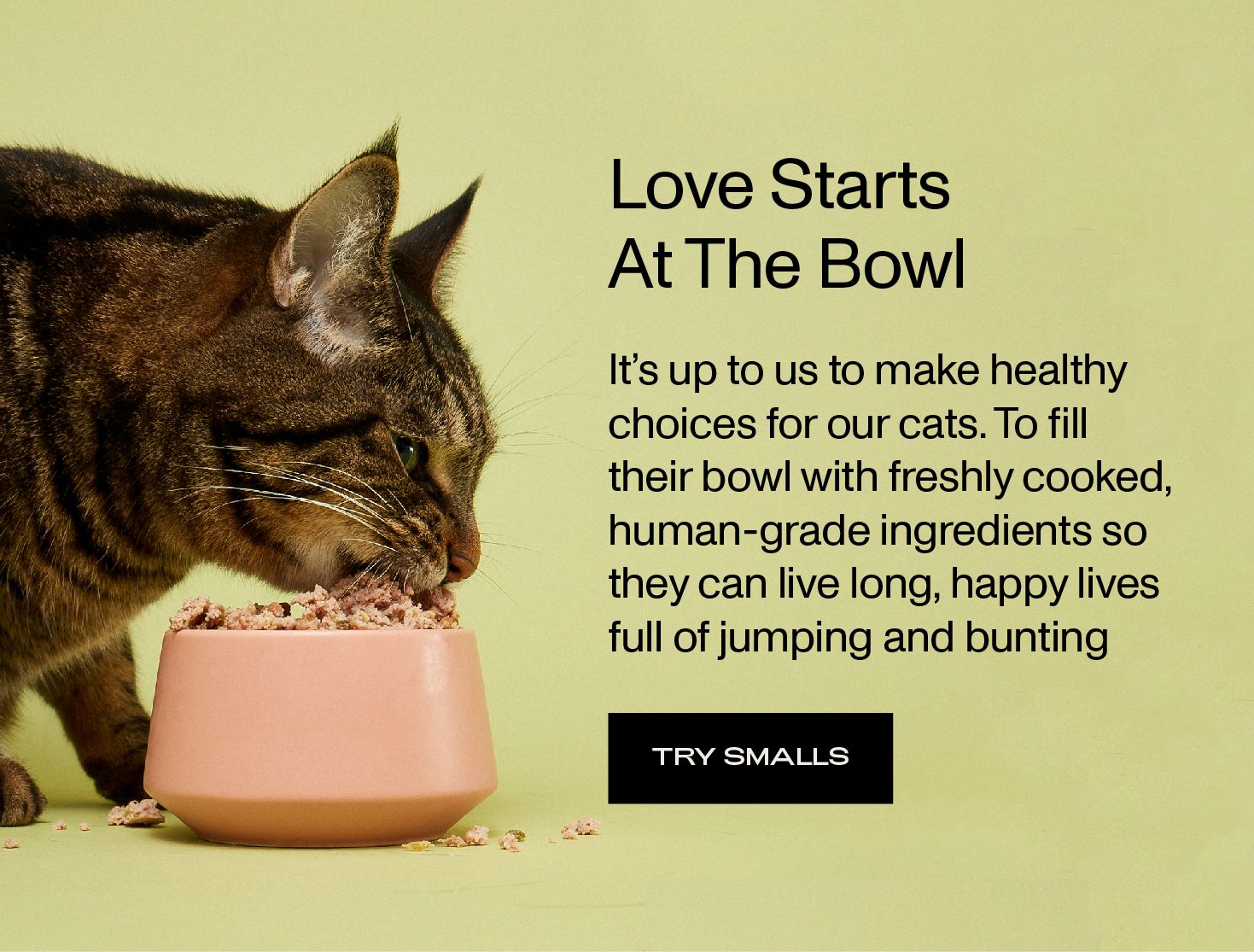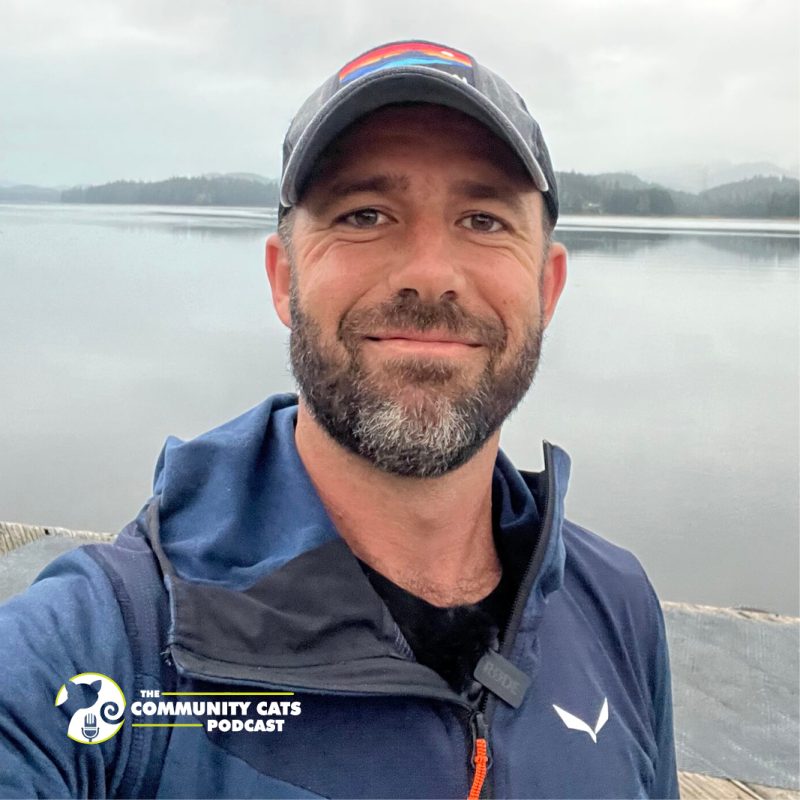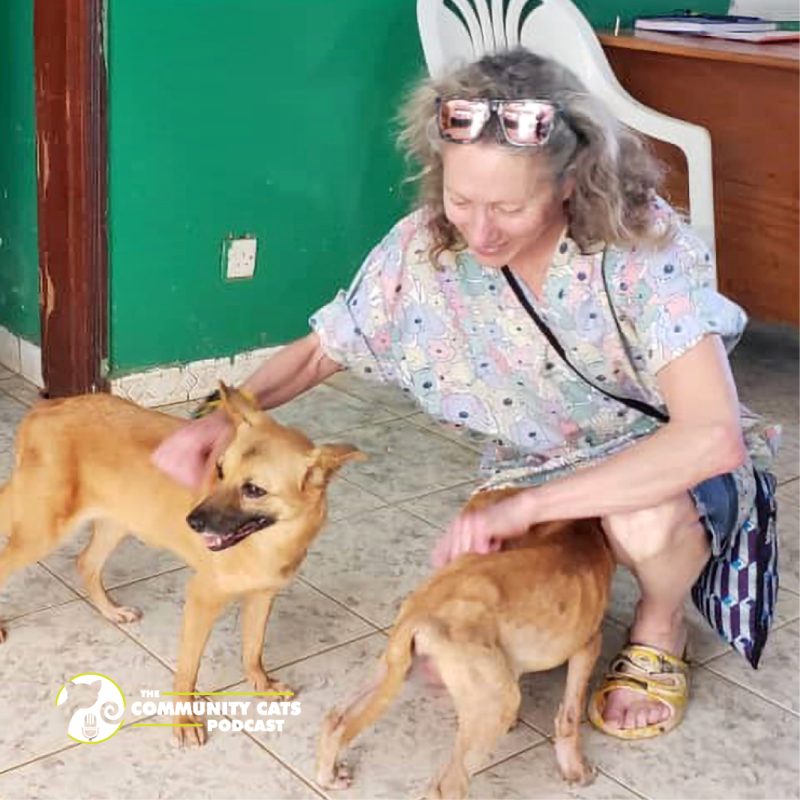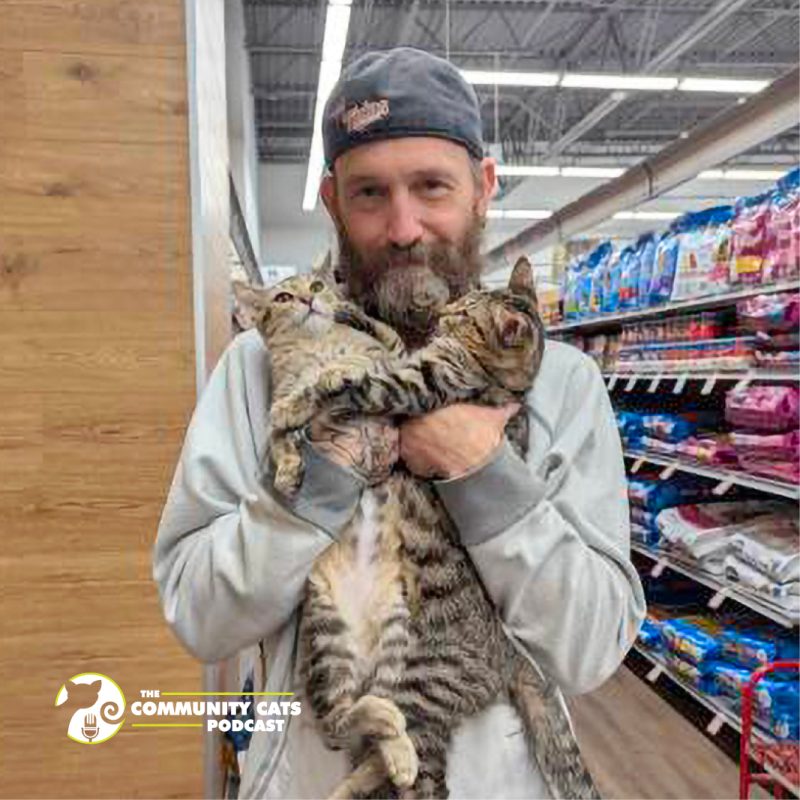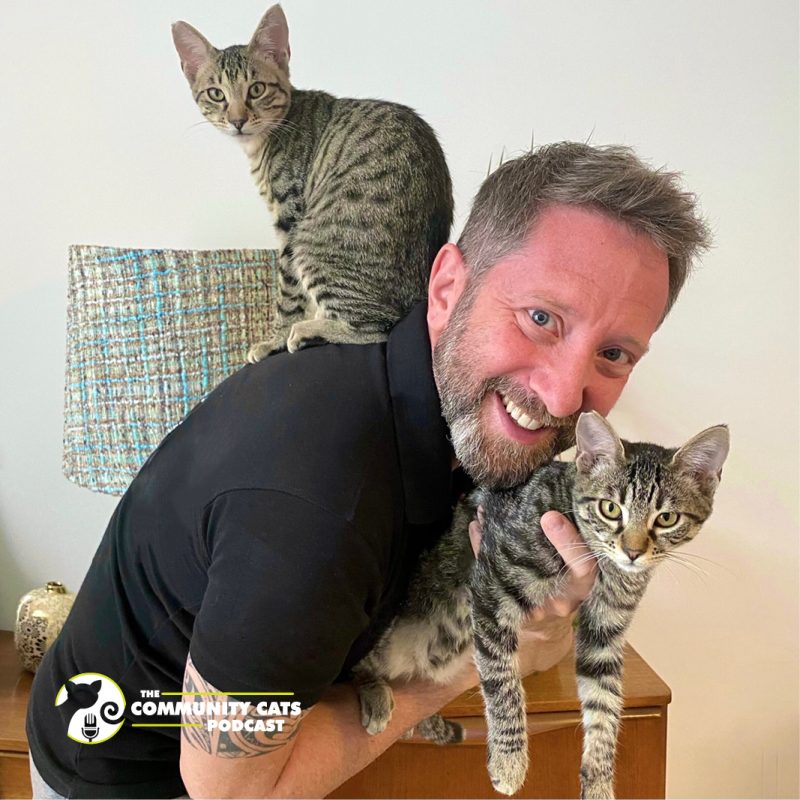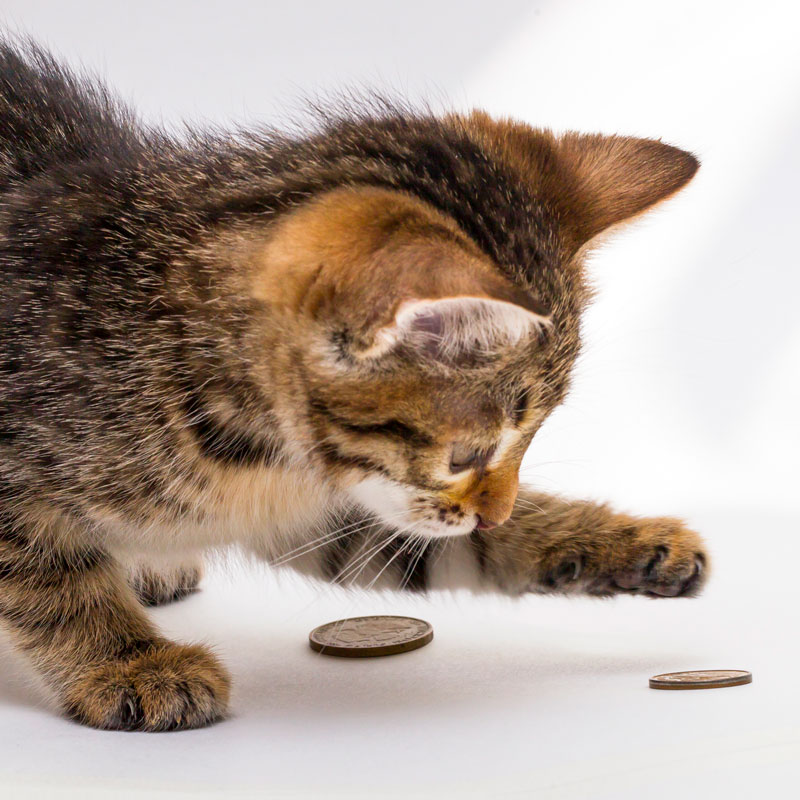
Yes, you can fundraise during a global pandemic! CCP’s Group 11 grantees showed us how.
June 17, 2021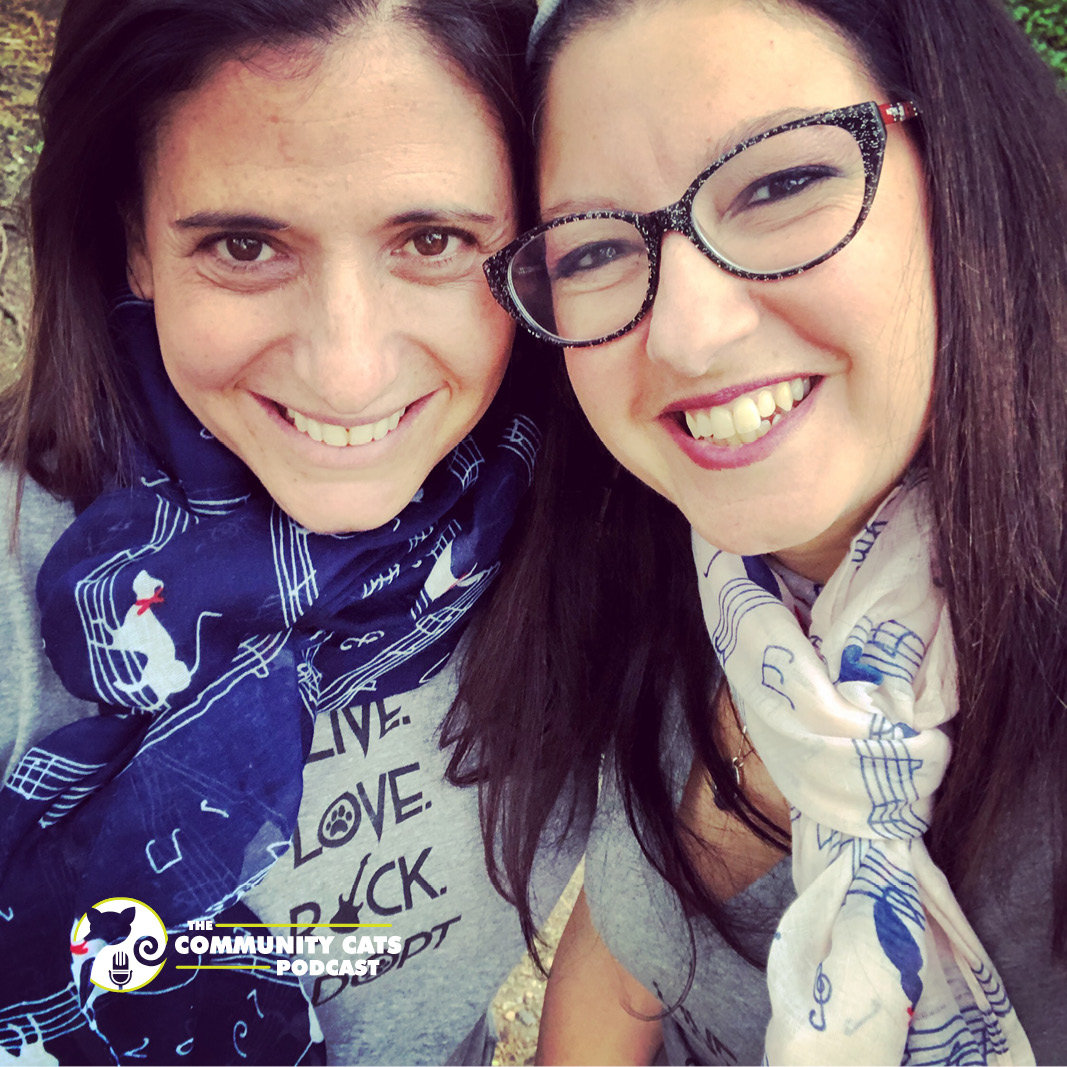
Juli Cialone and Marla Valentine, Rock N’ Rescue
June 29, 2021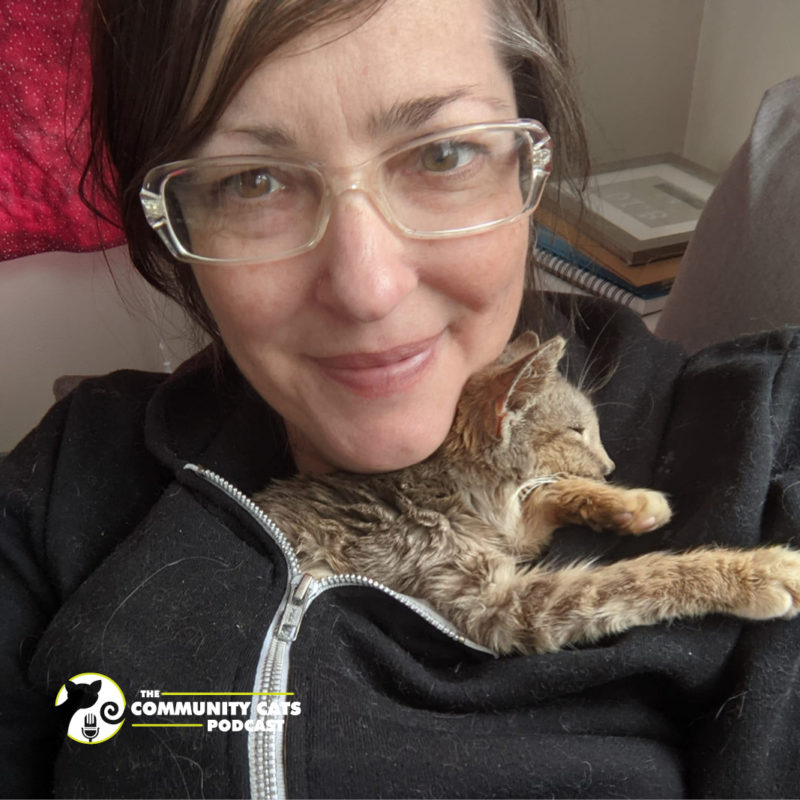
“There’s something really special about getting a kitten when its just a few hours old or a few days old or even a week or two old, and the amount that a kitten grows and changes in the first 4-6 weeks of life is amazing.”
Listen to Episode #409 Now
This episode is sponsored in part by Smalls Fresh Cat Food and Doobert.com.
This week’s guest is Andee Bingham, founder of Esther Neonatal Kitten Alliance in North Carolina. Andee noticed a need for a more specialized organization that could focus on neonates and support shelters that weren’t equipped to care for them. Then she realized she was someone who could start that organization and Esther Neonatal Kitten Alliance was born. Her program has a team of highly trained fosters and they work to support shelters by filling the gaps shelters have in neonatal kitten care, as well as helping shelters to build up their own program and foster network.
Andee and Stacy chat about different kinds of fosters and how people find the kinds of kittens they’re passionate about, what to do if you find a kitten outdoors, and Andee gives out some advice for those starting and running nonprofit organizations.
You can find Esther Neonatal Kitten Alliance on their website, and on Facebook and Instagram.
Read Episode #409 Now
Episode Highlights:
@ 00:03:37 – How Andee got involved in fostering neonates
@ 00:05:19 – How Esther Neonatal Kitten Alliance got its start
@ 00:09:13 – Andee’s number one piece of fundraising advice
@ 00:15:18 – How Esther Neonatal Kitten Alliance supports other organizations
@ 00:18:29 – What to do if you find a kitten outdoors
Full Transcript:
Kristen Petrie [00:00:02]
You've tuned in to the Community Cats Podcast. Ready? Let's go.
Stacy LeBaron [00:00:13]
Welcome to the Community Cats Podcast. I am your host, Stacy LeBaron. I've been involved in helping homeless cats for over 20 years with the Merrimack River Feline Rescue Society. The goal of this podcast is to expose you to amazing people who are improving the lives of cats. I hope these interviews will help you learn how you can turn your passion for cats into action. Today, we're speaking with Andee Bingham. Andee founded Esther Neonatal Kitten Alliance to provide care and rescue to orphan newborn kittens through loving foster homes, strategic partnerships with animal rescues and municipal shelters, and community education. While Andee loves all things feline, her affinity for helping the weakest and most vulnerable drives her passion for orphaned newborn kittens. Andee has personally fostered nearly 1,000 kittens under two weeks old and specializes in neonate critical care. Andee, I'd like to welcome you to the show.
Andee Bingham [00:01:05]
Hi Stacey. Thanks for having me.
Stacy [00:01:07]
So, before we dive into all of this great stuff about neonatal kittens, how did you become passionate about cats?
Andee [00:01:14]
I have always loved cats, ever since I was little. I've always loved them, whether it was cats just outside in my community or, you know, when I was probably about eight or nine, we started having cats in our family. But I've always loved them. And I became passionate about neonates when I moved to North Carolina and just started seeing how many of these orphaned newborn kittens were being found outside and how hard it was to find people to provide good care for them. So I started doing that and just have loved every moment of it.
Stacy [00:01:52]
And when was that? When was is that you sort of discovered neonates and started volunteering or helping out?
Andee [00:01:58]
So I started fostering neonates, probably, about five years ago. And that doesn't sound like very long, but I've been fostering neonates at a very high volume since then. So, yeah, about five years ago is when I started taking in my own neonates and haven't slept a whole lot since.
Stacy [00:02:20]
I tell you, and I'm going to be brutally honest, and say that the bottle feeding thing is something I have never done. Because I appreciate my sleep so much more than I could ever do that. Unfortunately, for kittens. It's just amazing what folks do for kittens during the course of the night. I had two kids. One of my kids didn't sleep through the night until she was six-and-a-half. And so, I learned to be a real fan--six hours of sleep straight was a very exciting thing. I know you can appreciate that. So, you are an amazing person. And thank you so much for taking care of so many kittens, and I will say the folks that do enjoy doing bottle babes, as I call them, there's just a significant tribe of folks, that fostering regular kittens just is not the same. Why do you think that is? I mean, in the foster care space, one would think, oh, well, we'll just foster anything. But you know, we really have developed our subcategories. There are some folks that like to do bottle babes, there other ones that just love it when a kitten hisses at them! It's like almost getting kissed by a kitten when that one hisses at you, and they get all excited. And I call those like the fluff and fold foster homes. You know, how do we go in these different directions? Do you have any sense as to how to identify these folks?
Andee [00:03:37]
Well, you know, I think for me it's really a matter of, you know, I really saw that there was just this really desperate need for people who were willing to wake up every two hours who are willing to take on these kittens who are so fragile and have a very high mortality rate. Honestly, I had the time to do it. I had the ability to learn the skills. I had the ability to wake up every few hours, and I now luckily, I have the ability to set a somewhat flexible schedule. So for me, I almost--in the beginning--I felt like I was almost obligated to do that work because these kittens needed it so desperately, and I had the ability to do it. So I felt like I just kind of should. But, you know, there's something really special about getting a kitten when it's just a few hours old or a few days old or even a week or two old. The amount that a kitten grows and changes in the first four to six weeks of his life is amazing. You know, you go from this little tiny bean of a kitten to a kitten who is running around and using a litter box and learning how to eat and playing, and that all happens in just a few weeks. So you really, if you're taking these kittens who are so tiny, you get to see this really dramatic change and you get to really understand that that only happened because you were willing to wake up every couple hours to give them that nutrition, and to give them the medical care, and that love. And it's just that, I feel like it's just so much more, you know, the impact that you're making is so much more obvious than older kittens.
Stacy [00:05:19]
So you started doing this five years ago, but you decided to start a nonprofit organization. The Esther Neonatal Kitten Alliance about two, two and a half years ago?
Andee [00:05:29]
About a year and a half ago.
Stacy [00:05:30]
A year and a half ago. So, even sooner than that. So, it's a very young organization. Was there a specific reason that you felt you needed to go from sort of individual into organization? What was the sort of plan around that?
Andee [00:05:45]
Yeah, so when I had been fostering otherwise, I had actually been working with another organization which was just kind of a bigger, general animal rescue. And what I saw while I was working there, was when kittens--when these neonates--were coming in the door, it really created an emergency situation every time it happened. And of course, we're located in North Carolina, so this happens all the time. You know, in the South, kittens and cats are breeding constantly. So, you know, I was watching every time these neonates would come through the door. A lot of staff would have to drop what they were doing. Would have to just go into immediate, what does this kitten need? And you know a lot of the staff there weren't super trained on how to give these kittens proper care. If I happened to be working that day, it was fine. And if I wasn't working that day, sometimes it was fine, and sometimes it really wasn't. You know, it just seemed like there was just a very obvious gap, and even though this organization was well-funded and they did a really great job with the other animals in their care, there was just this very obvious gap with these neonates. So, when I left that organization, I was just thinking about what my next move was. And I, you know, I just kind of kept coming back to this thought of, you know, wouldn't it be great if I could work for an organization that only deals with neonates? Because that's such a huge problem in this area. And I kept thinking it's too bad that that organization doesn't exist. And then I just had this epiphany, like, I'm the person to start that organization. I have 10 years of experience working in nonprofits. I have worked in all different roles in nonprofits. And I just decided that this was just what the next obvious step, the way that I could really make the biggest impact on neonates in my region and support these organizations who are doing such great jobs doing what they do, but they just don't have the time or specific resources to put into neonates.
Stacy [00:07:51]
So basically, you identified a problem, or not a problem, but an issue--a concern--and then you believed in the fact that you could make change and create that change. Which is what has happened with a lot of us. We all see stuff and we're like, you know what, I think we can do this in a little different way and it will work better for everybody. And we just go ahead and do it. And that's really what's so exciting. A lot of people say, oh, well, with such a young organization, you don't get access to fundraising, to money, to that kind of thing. And we actually had a conversation about, you know, a couple weeks ago or whatever, about how your fundraising capabilities have been pretty solid because who can say no to a cute little kitten and that kind of thing. And so, you've got probably one leg up on the folks, maybe, that have the big tomcat in the trap, trying to do their good work that way. But still, you have also looked at ways of doing fundraising for a young organization and trying to build up your coffers and resources from that standpoint. But for others that have new organizations whether they're doing TNR, or adoption and rescue, or neonate kitten rescue, or just thinking about starting a new organization, what sort of tips and tricks, if you have any tricks in your back pocket, would you be willing to share with folks?
Andee [00:09:13]
Yeah. I mean, my number one piece of advice, and this is easier to say than do, I understand, but I think the number one thing is to just understand that if you're not asking people for funding, the answer is always going to be no. So the more you ask, the more people are going to say yes. And if you're doing a really great job of telling your organization's story and really talking about your impact and really just showing the world why what you do is so important, which means having a good social media page, sending out an email every now and then to tell a story, the people who donate to you, give them a call every once in a while and have a conversation, check in on them. Give them an update. All of that is so important. But, you know, it's just so critical, to just ask people for what you need. And if you're not doing that, if you're too scared to do that, then nobody's ever going to say yes to you. And it's important to understand that when people love what you do, if they do say no, then it's almost always just that in that moment, they're not able to give you money. It's not that they don't want to give you money. It's not that they don't care about what you're doing. It's that they're just not able for whatever reason. They have a mortgage coming up or something, and they just can't do it in that moment. But that doesn't mean that, you know, in a month or two, you shouldn't ask them again. Or maybe, go a little smaller. Maybe ask them for a small monthly donation. Maybe ask them to give you ten dollars a month, instead of asking them to give you $500 right now. And I just think it's so critical also to just constantly be telling stories, you know, you can't just always be asking people for money. You need to really show them the impact that you're making. So we make it, if you follow our Facebook page, which is just Kitten Alliance on Facebook, if you follow our Facebook page and our Instagram we are constantly posting before/after photos and telling stories and you know, a year later we're posting pictures the adopters sent us, so they're cats and we post their before pictures and people just love that. They just love seeing that dramatic difference and impact you're making.
Stacy [00:11:28]
Yeah, I mean sometimes no means not right now. And also sometimes when someone says no, you can ask 10 people and they'll say no, and then the 11th one will be yes. And so if you get a no, it means you're one step closer to that yes. Sometimes I have a hard time with, you know, reaching out for events, for donations or sponsorships or something like that, and it's just like, well, no, I have to get out there because for the number of no's I get, I'll get a yes, somewhere along the line. So it's just you've got to keep plodding along. So I think that's great advice.
Stacy [00:12:04]
Give your feline friend, protein-packed meals they'll crave with Smalls. Smalls is fresh, human-grade food for cats delivered right to your doorstep. So you two can embrace your inner house cat. All cats are obligate carnivores. They need fresh protein-packed meals. Conventional cat food is made with profits in mind, using low quality, cheap meat byproducts, grains and starches coated in artificial flavors. Smalls, on the other paw, is made with cats in mind. Smalls develops complete and balanced recipes for all life stages with leading cat nutritionists. Starting with human-grade ingredients like you or I would find at the market, Smalls recipes are gently cooked to lock in protein, vitamins, minerals, and moisture. No room for fillers. No need for flavoring. Better quality ingredients mean a better, healthier life for your cat. Since switching to Smalls, cats have experienced improved digestion and a less smelly litter box, softer and shinier coats, plus better breath. Try Smalls today for your cats in your household. Hooch, loved it.
Kristen [00:13:05]
Use offer code Community Cats of check out for a total of thirty percent off your first order at Smalls.com.
Stacy [00:13:12]
Are you ready to be part of the solution for feral and stray cats in your neighborhood? If so, then make sure to sign up for our next Neighborhood Cats TNR certification Workshop. A new workshop is held online each month, generally on the first Saturday of the month, but please check our website for exact dates. For just ten dollars, expert instructors will teach you best practices for trap, neuter, and return. TNR. Learn what TNR is and why it works. We will cover getting along with neighbors, preparations for trapping, trapping itself, including entire colonies at once, feeding, providing winter shelter, and more. Take advantage of the interactive format, extensive handouts, and video footage of actual projects. Attendees, will receive a certificate of attendance and gain access to an ongoing Facebook group for networking with other TNR activists. The two-and-a-half-hour workshop is led by Susan Richmond, the executive director of Neighborhood Cats, and Bryan Kortis, Neighborhood Cats National Programs Director. To find out the date of the next workshop and sign up, just visit CommunityCatsPodcast.com.
Stacy [00:14:14]
As we emerge from the global pandemic of Covid, fostering is emerging as The New Normal in the animal welfare industry, but shelter management software doesn't provide the tools or the workflows for communicating with fosters at scale. So many organizations struggle to maintain hundreds of animals in foster homes. If only there was a system that was custom built specifically to solve this problem. Introducing Foster Space, powered by our friends at Doobert. Foster Space was custom-built to allow you to manage hundreds of foster relationships and to communicate with them via text, email, and even Facebook messenger. Your fosters have a portal where they can upload videos and photos and updates on their animals. And organizations can schedule fosters for meet-and-greets, adoption days, or anything else they need. There's so much more to check out. Sign up for free at www.doobert.com and go to the Foster Space tab to get started.
Stacy [00:15:08]
One thing that we had talked about a little bit in our pre-show conversation was about the importance of the Kitten Alliance, or Esther Neonatal Kitten Alliance, for being a support service for other organizations, whether local or farther away. Can you clarify what that means?
Andee [00:15:26]
Yeah. So our goal is to really help boost the save rates of neonates, and one way that we do that is by providing support to other organizations. So, like I said before, what we were seeing was that neonates just become an emergency situation where they end up in shelters, and some organizations are, of course, better prepared to deal with that than others. So the way that our shelter support program works is basically, we try to meet each organization where they are at and we do that by having a conversation with them to find out where exactly their gaps are. And so, the way that we support a well-funded organization, in a bigger city with a big following and good funding, you know, they might have some more minor need to fill like, maybe we just every now and then take a kitten from them for a few days who needs to be tube fed and they don't necessarily have their own foster base, somebody in their own foster base who can tube feed that kitten. But we can do that for them and we can do that until that kitten's ready to eat on his own and then we can send that kitten back to them. So, that's how we can support them. They have a great neonate program of their own, but they did, they do have this small gap that needs a little bit of help. But then, you know, there's other organizations that we support, who we partner with, who are in rural communities, who don't have a lot of funding, they don't have a huge foster base. Certainly, they don't have a big base of neonate fosters. And those organizations may need us to take pretty much any kittens that come to them who are under three weeks old. They might need us to take to take them. And then, there's organizations who are very far away from us. There are a couple organizations from California, or whatever, and their problem is that they don't have the time or skills to train new neonate fosters. So, we host a lot of webinars throughout the year that anybody can jump on for free. So, a lot of organizations are now sending their staff and new fosters our way to get that basic level of training. But basically, we're just trying to, you know, fill that need. So, we want to just support organizations in kind of whatever way we can, whatever way they need. But our goal is always to help these organizations over the course of a few years to build their own stronger neonate program. So, we kind of have this baby step program to kind of, you know, each year get them to kind of build up the amount of neonate fosters they have on their own and kind of build up their own programs. So that eventually they don't really need our support.
Stacy [00:18:12]
What sort of tips would you give folks in the general community if they come across really tiny, tiny kittens? How should they approach them? Should they touch them? Should they pick them up? Or should they see where Mom is? How would you handle a situation like that?
Andee [00:18:29]
So it's always important to remember that just because you find kittens outdoors, or in your garage or whatever, it doesn't necessarily, even if Mom isn't around, it doesn't mean that Mom isn't taking care of them. You know, moms have to eat, right? If they have a litter of five newborn kittens, they can't take them with them to hunt or to find food a few houses down. So just because kittens are alone, it doesn't mean that they're not being taken care of. And that's, unfortunately, a common mistake that people make. People find these kittens and they have the best of intentions, and they scoop them up right away and bring them to the shelter and then these kittens, a lot of them are unnecessarily orphaned. Which is, it's too bad. Kittens obviously will do best if they're kept with their mom until they are weaned. So what we always suggest is if possible, and if the situation is relatively safe, it's always best case scenario to wait a couple hours to see if Mom comes back. Now, there are a couple things you can look for to help determine whether kittens have been truly abandoned. So kittens who really don't have a mom around may be really greasy or dirty, because they're not being groomed. They may have an excessive amount of fleas, they're going to have maggots in their fur. They could be really screaming for food because they haven't eaten in a while. They may be very visibly sick or injured. Something like that. Maybe you come across kittens and the situation's really not safe. Maybe they're kittens who are in a construction zone and there's big heavy things being moved all around or, you know, maybe they're on the edge of a highway or something. It's not a super black-and-white situation, but it's really a matter of really taking a minute to assess the situation and knowing that just because a kitten’s outside, that doesn't mean that that kitten is unsafe. But there might be environmental factors that would make it an unsafe situation. But if at all possible, keeping kittens with their mom until they're weaned is best case scenario.
Stacy [00:20:43]
If folks are interested in finding out more about the Kitten Alliance, how would they do that?
Andee [00:20:48]
So, our website is KittenAlliance.org and you can also find us on Facebook and Instagram at Kitten Alliance.
Stacy [00:20:57]
And Andee, is there anything else you'd like to share with our listeners today?
Kristen [00:21:01]
I would just say that, you know, if anybody finds kittens, if you work with an organization and need any sort of support, definitely feel free to reach out and contact us through our website or through either of our social media accounts.
Stacy [00:21:13]
That's great. That's excellent. I would think you'd be really helpful to folks in rural areas that might not readily have the situation coming up on a regular basis and needing some support immediately. I've been getting a lot of requests for assistance with regards to TNR programs in rural areas, and I would think this would be kind of a similar situation. So folks, don't be shy. Reach out to Andee. She's here to help. She wants to make sure that folks have the information, the resources to be able to help those kittens right away. Because it's, I'm assuming, it's not an easy job. Especially first time around. So she can help guide you through that. Andee, I'd like to thank you so much for being a guest on the show and I hope we'll have you on again in the future.
Andee [00:21:59]
Thanks for having me.
Stacy [00:22:01]
That's it for this week. Please head over to Apple podcasts and leave a review. We love to hear what you think and a five-star review really helps others find the show. You can also join the conversation with listeners, cat caretakers, and me on Facebook and Instagram. And don't forget to hit follow or subscribe on Spotify, Apple podcast, Google podcast, YouTube, Stitcher, or wherever you listen to podcasts so you don't miss a single show. Thanks for listening, and thank you for everything that you do to help create a safe and healthy world for cats.
Kristen [00:22:32]
The Community Cats Podcast would like to shout out a few of our online event sponsors. Did you attend the United Spay Alliance conference in March? The incredible content and educational opportunity were brought to you in part by Marian's Dream and Humane Network. If you or your organization would like to sponsor content that you care about and that saves feline lives, go to CommunityCatsPodcast.com/sponsor and learn more about how you can turn your passion for cats into action.



